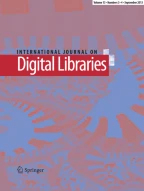Abstract
Historic research involves finding, using, and correlating information within primary and secondary sources, in order to communicate an understanding of past events. In this process, historians employ their scientific knowledge, experience, and intuition to formulate queries (who was involved in an event, when did an event occur etc.), and subsequently try to locate the pertinent information from their sources. In this article, the authors investigate how historians formulate queries, which query terms are chosen, and how historians proceed in searching for related information in sources. The insight gained from this investigation can be subsequently used for organizing documents within historical source repositories and building tools that will enable historians to access the needed information more rapidly and fully.
Similar content being viewed by others
References
Baeza-Yates, R., Ribeiro-Neto, B.: Modern Information Retrieval, 2nd edn. Addison Wesley & ACM Press, (2008), ISBN-13: 978-0321416919
Cruikshank, K., Daniels, C., Meissner, D., Nelson, N.L., Shelstad, M.: How do we show you what we’ve got? Access to archival collections in the digital age. J. Assoc. Hist. Comput. 3(2), (2005)
Duff W., Craig B., Cherry J.: Historians’ Use of Archival Sources: Promises and Pitfalls of the Digital Age. Public Historian 26(2), 7–22 (2004)
Dworman, G.O., Kimborough, S.O., Patch, C.: Pattern-Directed Search of Archives and Collections. Journal of the American Society for Information Science 51(1), (2000); Special topic issue: When museum informatics meets the World Wide Web, 2000, 14–23, ISSN:0002-8231
Fellbaum, Ch. (ed.): WordNet: An Electronic Lexical Database. MIT, Cambridge (1998); ISBN-13: 978-0-262-06197-1
Gazzaniga, M.S., Ivry, R.B., Mangun, G.R.: Cognitive Neuroscience, The Biology of the Mind. W. W. Norton & Company, New Ed edition (1998), ISBN: 978-0393972191
Han, H., Giles, C.L., Manavoglu, E., Zha, H., Zhang, Z., Fox, E.: Automatic document metadata extraction using support vector machines. In: Proceedings of the 3rd ACM/IEEE-CS joint conference on Digital libraries, Houston, Texas, pp. 37–48 (2003)
Identifying primary and secondary sources—a preliminary guide. http://www.libraries.iub.edu/index.php?pageId=1483. Accessed Sept 7 2010
Investigative Techniques Glossary, http://www.pbs.org/opb/historydetectives/techniques/glossary.html. Accessed Sept 7 2010
KAON, http://kaon.semanticweb.org/. Accessed Sept 7 2010
Katifori, A., Torou, E., Vassilakis, C., Halatsis, C.: Supporting research in historical archives: historical information visualization and modeling requirements. In: Proceedings of the 12th International Conference on Information Visualization IV 08, pp. 32–37. London, (2008)
Leiner, B.: Bm: The scope of the digital library, draft, DLib working group on digital libraries metrics, January 16, (1998). http://www.dlib.org/metrics/public/papers/dig-lib-scope.html. Accessed Sept 7 (2010)
Nadeau D., Sekine S.: A survey of named entity recognition and classification. Linguisticae Investigationes 30(1), 3–26 (2007)
Open and closed questions: http://changingminds.org/techniques/questioning/open_closed_questions.htm. Accessed Sept 7 2010
Pitti, D.V.: Encoded archival description, an introduction and overview. D-Lib Magazine 5(11), (1999)
Protégé project, Stanford University, http://protege.stanford.edu. Accessed Sept 7 2010
Tibbo, H.R.: Primarily history: Historians and the Search for Primary Source Materials. In: Proceedings of the 2nd ACM/IEE-CS joint conference on Digital Libraries, 1–10, (2002)
Torou, E., Katifori, A., Vassilakis, C., Lepouras G., Halatsis, C.: Capturing the historical research methodology :an experimental approach, International conference of education, research and innovation, Madrid, ICERI (2009)
Wang, W., Xiao, Ch., Lin, X., Zhang, Ch.: Efficient approximate entity extraction with edit distance constraints. In: Proceedings of the 35th SIGMOD international conference on Management of data, pp. 759–770, Providence, Rhode Island (2009)
Zarri, G.P.: Semantic Web and Knowledge Representation. In: Proceedings of the 13th International Workshop on Database and Expert Systems Applications (DEXA’02), Aix-en-Provence, France (2000)
Zarri, G.P.: Representation and Management of Narrative Information Theoretical Principles and Implementation. Springer-Verlag London Limited, (2009). ISBN: 978-1-84800-077-3, doi:10.1007/978-1-84800-078-0
Author information
Authors and Affiliations
Corresponding author
Rights and permissions
About this article
Cite this article
Elena, T., Katifori, A., Vassilakis, C. et al. Historical research in archives: user methodology and supporting tools. Int J Digit Libr 11, 25–36 (2010). https://doi.org/10.1007/s00799-010-0062-4
Published:
Issue Date:
DOI: https://doi.org/10.1007/s00799-010-0062-4
